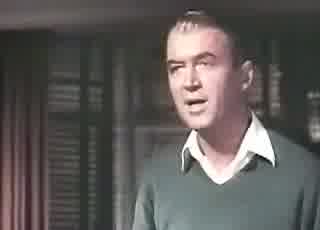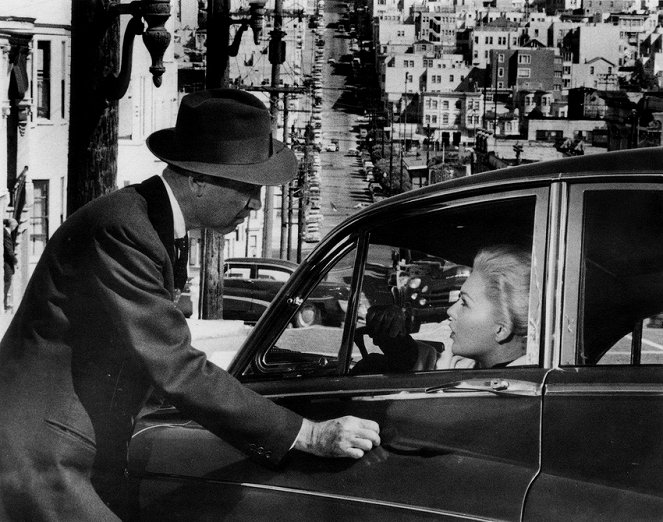Réalisation:
Alfred HitchcockPhotographie:
Robert BurksMusique:
Bernard HerrmannActeurs·trices:
James Stewart, Kim Novak, Barbara Bel Geddes, Tom Helmore, Henry Jones, Ellen Corby, Konstantin Shayne, Lee Patrick, Alfred Hitchcock, June Jocelyn (plus)VOD (3)
Résumés(1)
Scottie est sujet au vertige, ce qui lui porte préjudice dans son métier de policier. Rendu responsable de la mort d'un de ses collègues, il décide de quitter la police. Une ancienne relation le contacte afin qu'il suive sa femme, possédée selon lui par l'esprit de son aïeule. Scottie s'éprend de la jeune femme et se trouve ballotté par des évènements qu'il ne peut contrôler. (Théâtre du Temple)
(plus)Vidéo (2)
Critiques (7)
A wonderfully mysterious film, the kind of honest spectacle that gets more and more interesting and suspenseful, and is a joy to watch the first and hundred and first time around. James Stewart gave a tremendous performance, and he fell for Kim Novak in a way that probably anyone would. And Hitchcock's thoughtful shots are more than just tinged with Herrmann's music - it's just a sensation.
()
It’s overcomplicated, but fun. Admittedly, it has totally insane colors, makeup was obviously put on Stewart and Novak by a colorblind makeup artist, and the rear projection follows one plot twist after another... But at least the fetish will remain in the end. Because only those who have nothing left to lose will kiss like that. There are interesting acting creations and as a bonus Barbara Bel Geddes - alias Miss Ellie.
()
An interesting and mysterious genre mix that left me quite confused. Not that I didn’t get it, Vertigo is made with such finesse and sensitivity that it’s impossible to get lost (in fact, I’d say it allows for several interpretations), what confused me is the way it becomes something different every five minutes. For a moment it’s a thriller, then sci-fi followed by a romantic bit, only to carry on as a crime drama. I don’t have anything against it, I had a lot of fun, but I prefer Hitchcock when he’s more genre pure. 8/10
()
Two provocative psychoanalytic theses - "a woman does not exist" and "a woman is just a man's symptom" - find their dizzyingly accurate, yet simple expression in Vertigo. The hero obsessed with the fantasy construction of a femme fatale (a woman who is too fragile to actually exist) goes through two key stages - a stormy melodramatic love story and disillusioned psychological drama. In the first part, charged with convention, we follow the archetypal story of romantic love for a woman doomed to die, in the second a refined analytical study of the male obsession with fantasy, the impossibility of fulfilling it with "reality", to the sadistic desire to transform a real female body into an unrealistic fantasy shape (pleasure, fulfillment). The ending then subtly opens up the question of what the hero's vertigo real lies in - in the experience of the "depth" of the real world, or in the menacing depth of a woman's gaze, which hides the bizarre and elusive shapes of potential ideas and concepts? The seemingly simple and, at some stages, perhaps excessive system is actually a precise analysis of the relationship between a man and a woman, which makes the almost consistent "desexualization" of the aged James Stewart even more eloquent. A fantastic film that can make your head spin because it accurately names the terrifying emptiness of desire.
()
I've seen too many films by Alfred Hitchcock to consider him an undisputed master of directing - too often I watched in disgust a story that, despite its fame, must have been naive even at the time of its creation. However, Hitchcock did not gain his reputation for free, and there are several titles where I nod approvingly and say, "Yes, this still works after all these years." I place Vertigo in the elite group among such titles as Psycho or Rear Window. It is a film about a murderous conspiracy, where Hitchcock used his favorite motif. An average guy is maneuvered into a terrifying mystery game that emotionally marks him for the rest of his life. Hitchcock's favorite interest in psychoanalysis does not come across as amusingly here as it does in the case of The Man Who Knew Too Much. Hitchcock combines the crime genre with romance and enriches them with mysterious and sensual elements. With ingenious camera movement, often directed into the depths, and disharmonic music, the director excellently evokes the feeling of the protagonist's turmoil, highlighting his uncertainty and fear. Vertigo represents excellent craftsmanship, a journey to uncover the identity of a fateful woman full of hints, mirror reflections, and playful use of color contrasts that can be appreciated even after repeated viewing. Vertigo belongs among the creative films that paved the way for new film methods and elements. Overall impression: 90%.
()



Annonces